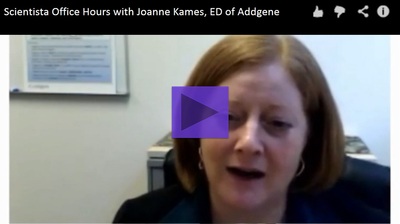Women in Science Series - Scientista Special Content!
The Scientista Foundation is a non-profit partner of the Women in Science video series, sponsored by Mettler Toledo and Labx and hosted by Elise Andrew of I F*cking Love Science. YOU have the opportunity to submit YOUR questions for the upcoming interviewees using the form below.
INTERVIEW WITH DR. CARLA SHATZ
Watch all Women in Science Exclusive Interviews
INTERVIEW WITH PF. ANNE W. RIMOIN, PHD, MPH
0:30 "Why did you decide to study infectious diseases?"
1:20 What is the quetion that you are most interested in trying to answer through your research?
3:15 What advice would you have for a college student who is interested in pursuing a PhD?
4:46 What's the one piece of advice you wish someone would've given you?
5:35 "What can we do as individuals to be better science communicators,advocators, or even more scientifically literate?" [Asked by Andi Packheiser at Texas A&M University - Corpus Christi]
7:03 What is the biggest challenge of designing sustainable disease surveillance programs? [Asked by Shaira Bhanji at Harvard University]
INTERVIEW WITH DR BAHIJA JALLAL
INTERVIEW WITH DR ELODIE GHEDIN
UPCOMING INTERVIEWS
> Watch the latest video interview with Dr. Elodie Ghedin!

Anne W. Rimoin, Ph.D., M.P.H.
(Submit questions by 4/14)
Anne W. Rimoin, Ph.D., M.P.H. is an infectious disease epidemiologist whose research focuses on emerging infectious diseases (EIDs), especially those of animal origin. She is an Associate Professor in the Department of Epidemiology at UCLA School of Public Health and trained at Middlebury College (B.A. African History, 1992), UCLA School of Public Health (M.P.H, International Health and Nutrition, 1996), and the Johns Hopkins Bloomberg School of Public Health (Ph.D. International Health, Division of Disease Prevention and Control, 2003).
Dr. Rimoin's methodological expertise is in the design and implementation of disease surveillance programs, epidemiologic studies, and field trials in developing countries, particularly in sub-Saharan Africa. In 2007, she founded Congo BioMed, a foundation created to promote biomedical research, training and sustainable health programs in the Democratic Republic of Congo.
Currently, Dr. Rimoin directs an epidemiologic study of human monkeypox in the DRC. She has established a research site in central DRC which now serves as the headquarters for a variety of studies of cross species transmission of disease.
http://www.ph.ucla.edu/epi/faculty/rimoin/rimoin.html
Dr. Bahija Jallal, Executive Vice President of AstraZeneca and head of MedImmune
(Submit questions by 4/22)
Dr. Bahija Jallal is Executive Vice President of AstraZeneca and head of MedImmune, a global biologics research and development organization with locations in Gaithersburg, California and Cambridge, UK. She is a member of the senior executive team at AstraZeneca reporting to the CEO.
Dr. Jallal is passionate about leading and shaping MedImmune’s rich pipeline of drugs targeting cancer, infections, respiratory and inflammatory diseases, cardio-vascular and metabolic diseases and pain to ultimately develop new medicines for patients.
Dr. Jallal has authored over 70 peer-reviewed publications and has over 15 patents. She is a member of the American Association of Cancer Research, the American Association of Science and the Pharmacogenomics Working Group. She serves as a member of the Board of Directors for the Association of Women in Science and an advisory board member of the Healthcare Business Women’s Association. She was named one of FierceBiotech’s 2011 Women in Biotech and in 2012, she received Washington Business Journal’s Women Who Mean Business award.
http://www.medimmune.com/about-medimmune/leadership
Carla Shatz,PhD Neurobiologist, Stanford School of Medicine
(Submit questions by 7/24)
An American neurobiologist and a member of the American Academy of Arts and Sciences, the National Academy of Sciences, and the Institute of Medicine. Dr. Shatz is one of the pioneers who determined some of the basic principles of early brain development. She found that the spontaneous activity of neurons in utero is critical for the formation of precise and orderly neural connections in the central nervous system. Her recent work shows that waves of spontaneous activity in the retina can alter gene expression and the strength of synaptic connections.
http://med.stanford.edu/profiles/Carla_Shatz/
Scientista Office Hours!
The Network for Pre-Professional Women in Science and Engineering
The Scientista Foundation is a registered 501(c)(3) -- Donate!


